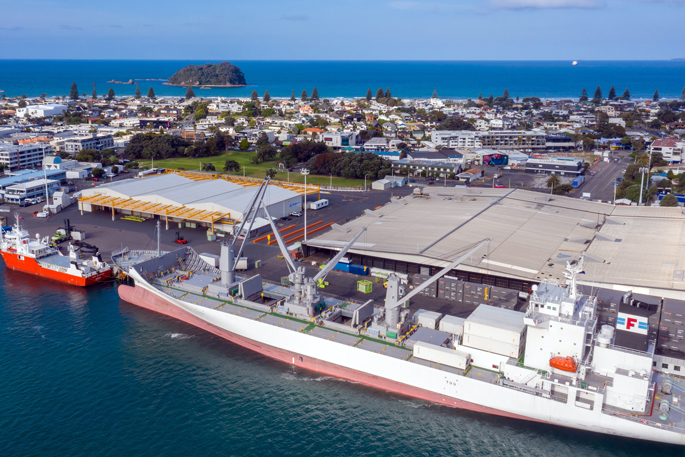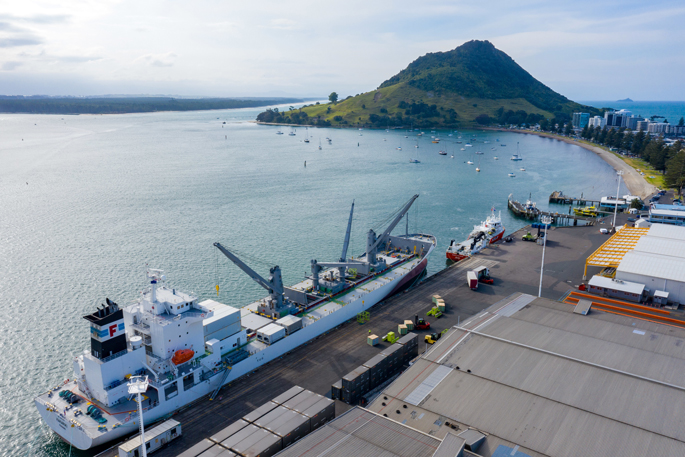FCC, one of the international shipping partners of Zespri, has successfully completed a trial using biofuel in a charter vessel operating between Hong Kong and New Zealand.
The purpose of the trial was to test the performance of the ship’s engines when burning biofuel.
The vessel Kakariki bunkered the biofuel in Hong Kong at the end of last month before starting its voyage south, arriving at the Port of Tauranga at the weekend.
The vessel was powered by a blend of biofuel which is made from used cooking oil. The Kakariki bunkered the biofuel in Hong Kong because there is none available in New Zealand - if and when biofuel does become available in New Zealand it will present more opportunities for Zespri’s chartered ships to burn this low-emission fuel.
Zespri Chief Operating Officer Jason Te Brake says the biofuel trial by FCC is a collaborative step forward for the industry as it seeks to decarbonise and future proof through innovative solutions such as low emissions shipping.
“Shipping plays a critical role in New Zealand’s export driven economy, carrying 99 percent of New Zealand’s trade by volume and around 80 percent by value. Globally, the sector is responsible for around 80 percent of world-wide trade volumes and 70 percent of worldwide trade value.
“Every year we ship our Zespri Kiwifruit to consumers in more than 50 markets around the world. International shipping accounts for around 43 percent of Zespri’s emissions footprint for fruit sold globally – this makes up a larger part of our emissions compared to other primary sector exporters given the low-emissions nature of our product. Last year, the industry used 57 charter vessel sailings during the season, plus another 13,300 containers, shipping over 619,200 tonnes of New Zealand kiwifruit to our markets.
“With Zespri having limited ability to directly reduce shipping emissions ourselves, we’re working with key shipping and distribution partners like FCC to increase the efficiency of our shipping and logistics, and make the transition to low emissions fuels.
“The biofuel trial with FCC is an important step forward and has given us both important technical insights, with the Kakariki monitored throughout its journey to make sure the biofuel performed well with no unforeseen technical issues. It’s fantastic to see it dock successfully in Tauranga.”

FCC Director Toshiyuki Koga says FCC is proud to see the Kakariki, which is the company’s first vessel to trial biofuel, arrive safely in Tauranga.
“We have been in discussions with Zespri for a number of months about carrying out this trial and are now looking forward to further biofuel trials using other FCC vessels. We are also considering a northbound trial taking Zespri Kiwifruit to market this season.
“Biofuel supply chains are complex and there is still work to be done to ensure stable supply, however this trial is a first step towards decarbonisation with Zespri.”
Jason Te Brake says, “New Zealand’s place at the bottom of the South Pacific Ocean means accessing low emissions fuel options is a challenge, and we are actively seeking partners to shore up access to more sustainable fuels to meet our ambitious targets and the expectations of our customers and consumers.
“It’s been positive working with our long term partner FCC recognising the importance of decarbonising and future proofing the industry. This trial is a step forward and we’re pleased to be on the path to introducing low emissions fuels to carry Zespri Kiwifruit to our markets around the world in the future.”



1 comment
The Master
Posted on 12-06-2024 12:37 | By Ian Stevenson
Unsure of the positive outcomes here?
Both Bunker fuel/oil (typical ship fuel) and cooking oil are primarily made of of carbon and hydrogen. So how exactly is that helpful to remedy the CO2 levels? When you burn any/all of it, included is the emissions you get CO2.
Does it burn cleaner? Like less Carbon monoxide and more CO2?
It all sounds just so wonderful but it is missing and devoid the facts, science and reality in the outcomes, results and actual benefits of any of it. The point of it all is what exactly? What extra does it cost? Is CO2 more or less?
Leave a Comment
You must be logged in to make a comment.